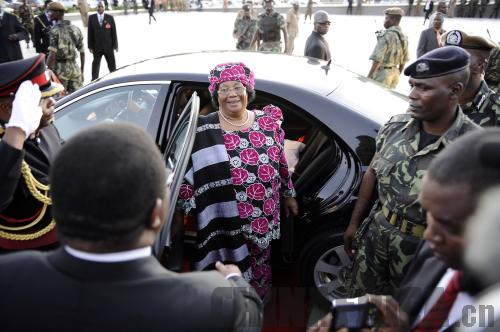|
 |
|
Malawi President Joyce Banda |
Africa's second woman President, Joyce Banda of Malawi, has made a positive global impact with her determined efforts to breathe new life into the small nation. Specifically, her efforts to introduce economic reforms in line with the International Monetary Fund have been lauded abroad. Why then do her own country's citizens harbor such doubt and mixed feelings about her as the first year of her term comes to an end?
Experts and commentators, while divided over Banda's performance, do agree that her government must walk the walk on austerity measures.
Civil servant backlash
Banda's decisions to devalue the local currency, the kwacha, in a bid to stabilize the economy, as well as introduce the Economic Recovery Program (ERP) were hailed by IMF, but led to protests at home, including a nationwide strike by civil servants in February.
Some Malawians blame President Banda's austerity measures for the nation's current economic woes.
Civil servants were demanding a pay raise of more than 65 percent. They insisted that by floating the kwacha, its devaluation had led to inflation, which had seriously eroded the value of their salaries. The prices of maize, sugar, salt and services had more than quadrupled.
According to the Center for Social Concern, a local research institution investigating the cost of living in urban Malawi, the food situation in the country remains dire.
In a country where the minimum monthly wage is about $20, a family of six needs an average of $200 per month to meet their basic food needs.
The opposition Democratic Progressive Party (DPP) Legislature member Kondwani Nankhumwa did not mince his words when discussing Malawi's economy, echoing what many Malawians are thinking. He was quoted in the Malawi Voice as saying that the economy has become fragile since the introduction of the ERP, which among other problems, led to the devaluation of the kwacha. Nankhumwa argued that the reforms have brought poverty to Malawians.
Critical of the way the president celebrated her first year in office, Abel Mwanyungwe, an economics lecturer at the University of Malawi, said that the celebration funds should have been used to supply Malawians with bare necessities.
These sentiments were echoed by United Democratic Front President Atupele Muluzi, who told the Nyasa Times that Banda had inherited a very difficult state of affairs, and her administration had to make some very tough decisions in order to help the economy recover.
"These reforms have not been easy on Malawians, but we had limited choices. The reform measures undertaken were unavoidable, and to ensure the success of these reforms, they must be premised upon building state capability, accountability and responsiveness." Muluzi pointed out that good governance is crucial to the success of the recovery plan.
Some ordinary Malawians think Banda has achieved a lot over the last 12 months, including bringing more donor aid into the country, ending the fuel crisis and foreign exchange shortage after consultations with the private sector. Under the previous Bingu wa Mutharika administration, Malawi had only erratic access to fuel supplies because the country's international suppliers did not have confidence in its economy.
One local resident told DW World that Banda had "made tangible decisions, such as signing the power agreement with Mozambique and renewing vital diplomatic ties with the UK, Zambia and Mozambique."
Other moves that have earned the president praise in some quarters include selling the presidential jet, and awarding civil servants a pay raise after they called a strike.
Chris Chisoni, National Secretary for the Catholic Commission for Justice and Peace (CCJP)'s, while conceding that many Malawians are angry because their expectations have not been met, said Banda had already accomplished a great deal by ensuring a regular supply of fuel. But he also warned that her successes are fast being eroded by food [maize] shortages and skyrocketing commodity prices, including unstable fuel prices.
"It is a double-edged sword that the achieved gains have, for instance, mended global bilateral relationships, but have not translated into effective and meaningful service delivery to Malawians," he said.
Helping women
The NGO Gender Coordinating Network is also happy about the availability of fuel, saying it has a bearing on saving women's lives.
"Irrespective of where the fuel is sourced, it has made a big impact, since previously women would die in transit to give birth because vehicles lacked fuel. The availability of fuel has also helped stimulate women's economic empowerment," said Network chair, Emma Kaliya.
She also praised the president for appointing women to senior public positions.
But what does Banda herself say about her first year in office? In an interview with the BBC Focus on Africa, the president commented on her score card, saying Malawians should judge her on performance.
"I want Malawians to look back, at least where we were. Did we have fuel or not?" she asked.
She confidently stated that having looked at the polls, she knew where Malawians had placed her and it looked very positive.
"The feedback that I am getting a year on is different in urban and rural areas. The rural people have faith and love for me," she said. CA
(Reporting from Malawi) |